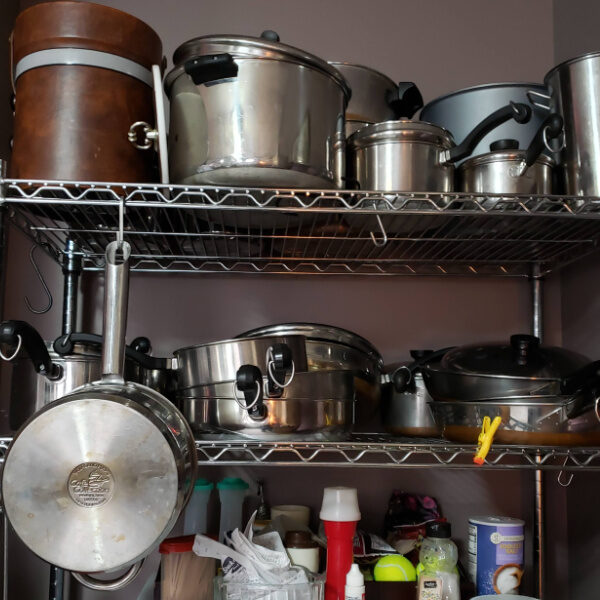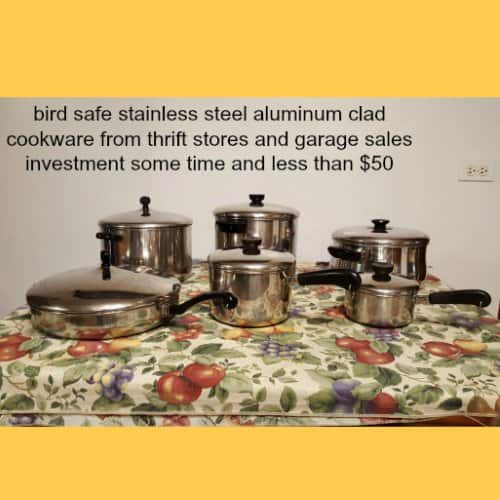One of the first things new pet bird keepers learn is that Teflon is bad for your bird which is pretty well-known. The statement “I threw out all my Teflon cookware before I brought my bird home” can be found on the internet as often as Lady Gaga changes hairstyles.
The potential danger of Teflon does go beyond cookware so I wanted to give you a little background.
The plastic PTFE was discovered in 1941. Tetrafluoroethylene has a fun name – Teflon (Chicago is filled with “Teflon” politicians) is a resin that resists caustic chemicals in high heat. You can’t hear it, you can’t smell it but it’s a killer of caged birds.
I recently ran across the mention of a Teflon “bird mishap” where 21 birds were lost at the San Antonio zoo – a zoo that installed heat lamp bulbs coated with Teflon. When the birds gathered around the Teflon-coated heat lamp bulbs to stay warm, they died.
An agonizing death will befall a bird who ingests Teflon. The fumes dance on air currents and are highly focused and may affect one bird but not another, but the Fumes do travel and the bird does not have to be in the same room as the Teflon fumes to succumb to them.
It’s been reported that Teflon heated as low as 285° will off gas & can kill a bird.
Teflon is found in places you never think of like these items that permeate our daily lives (just like Java script – it’s found everywhere) – this is from DuPont’s website:
Apparel & Accessories – DuPont™ Teflon® fabric protector helps keep garments looking new longer, no matter what life throws at them.
Contract & Technical Fabrics – Whether in a restaurant, hotel, office or other demanding location, fabrics treated with DuPont™ Teflon® (like awnings and patio umbrellas) fabric protector outsmart stains by fending off unsightly splashes and spots, day after day, in a variety of applications.
Home & Garden Products – DuPont™ Teflon® Advanced is a carpet protector that uses DuPont technology to provide more repellency than any other carpet protector. It repels most liquids, allowing spills to be removed before staining and wicking can occur.
Products made with Teflon® Home Fashions & Residential Furnishings like DuPont™ Teflon® fabric protector improve a variety of fabrics around the home including upholstery, bedding, napery, and outdoor furniture.
Prespray Lawn Mower Protectant – DuPont says it will keep your lawn equipment looking new by using Clean Machine® Mower Nonstick Protectant with DuPont™ Teflon® surface protector.
Eyeglasses – Sola Lens Coating – Teflon® EasyCare eyeglass lens coating was developed by Carl Zeiss Vision, a world leader in eyeglass lenses, in association with DuPont.
Teflon® fluoropolymer technology is used in HEAD® Tennis Racquets.
Teflon® fluoropolymer technology is used for lubricants for cycling Finish Line Lubricants for Cycling Race has proven on the road and off since 1988 that bicycle ball bearing grease prevents wear and distortion.
Zardoz® NotWax® provides the sensation of effortlessly gliding through any snow condition. Just wipe NotWax® on your ski or snowboard base and go.
Okay so we know you are careful not to take your bird when you go skiing, play tennis, mow the lawn, ride a bicycle, wear eyeglasses (they do like to grab onto them), eat out at restaurants and you have no carpet in your home – I get it – you like to play it safe.
But ask yourself – “self, do I have any of the Teflon-coated instruments of destruction, in my home mitchr listed below – like”
Bread makers
Broiler pans
Coffeemakers
Corkscrews
Crockpots
Deep fryers
Electric skillets
Oven drip pans
Stovetop burners |
Griddles
Hair Dryers
Heat lamps
Hot air popcorn poppers
Ironing board covers
Lollipop molds
Many cooking utensils
Never stick stainless steel
Nonstick gingerbread molds |
Nonstick rolling pins
Pizza pans
Portable heaters
Roasters
Sole plates on irons
Stockpots
Tortilla presses
Waffle makers
Woks |
You’ve been warned.
What got me thinking about the whole Teflon thing was when Jo-Anne wrote to ask if she should be concerned about Teflon in humidifiers. Here’s my response about humidifiers and their dangers to birds:
Hi Jo-Anne
Keep in mind there is not a lot of Teflon in household humidifiers. It’s in warming humidifiers like Vick’s warm mist humidifier which does contain Teflon on the water heater.
While most studies indicate that PTFEs & PFOAs off-gas at temperatures above 500 degrees Fahrenheit, there is information that some formulations will off-gas between 285 degrees and 450 degrees Fahrenheit. I don’t think Teflon is your problem with a (non-warming) household humidifier.
The problem with humidifiers is allowing mold to grow on the filter, then mold gets spewed out with the moist air causing problems like Aspergillosis which is a disease of the lungs that birds get triggered by a fungus that is found almost everywhere in the environment.
Humidifiers form the perfect storm for the production and transmission of Aspergillosis-producing fungus because fungus loves warm moist environments and we’re not talking about Jamaica.
Usually, it’s not harmful to birds unless the bird’s immune system is compromised by things like bacterial infections of the mouth from drinking poop water, brooding activities like egg laying, and feather molting which all three can occur simultaneously as we learned from our cockatiel Popcorn.
Those 3 issues reduce the bird’s immune system which then puts the bird in harm’s way from fungal infection. Which begs the question how do you know if your bird has Aspergillosis?
Heavy breathing, a loss of appetite, and lots of drinking and pooping of a bluish coloration of mucus are signs of acute Aspergillosis which can and do lead to death
Chronic Aspergillosis is harder to detect because the symptoms might not manifest themselves too rapidly. The fungal spores flow through the birds’ complete system via the bloodstream and then most of the major organs will get affected.
This is a disease that’s very hard to detect even for a veterinarian. It can be treated with surgery to remove easy-to-reach lesions and there are antifungal drugs available.
So getting back to your original question – Make sure your humidifier is sized proportionately for the room, home, or apartment it’s going in. More importantly, use an additive to eliminate fungus on the filter and watch the filter for any discoloration like fungal spores.
Replace the filter immediately if any (fungal spores, dark spots) are spotted. The humidifier will help keep your birds skin moister just like yours and mine. Humidifiers are not inherently bad. You just need to be on task about the mold thing.
We know you pay attention to your cage birds keeper’s to-do list which is making sure food and water are clean, the newspaper in the cage is changed regularly and all the toys, perches, and accessories are sanitized thoroughly once a month with an enzymatic cleaner like poop off and bird safe sanitizer like Pet Focus or a handheld steamer.
Written by Mitch Rezman
Approved by Catherine Tobsing
Additional info added 1/22/19
Hi, love your weekly posts very much – excellent!
Just wanted to pass on the information that I bought a Vicks Warm Mist Humidifier (Model 845 series, sold in Walmart, Target & Rite Aid for about $25 – $30) and called the Vicks Customer Service phone to check about the possibility of Teflon or PTFE in the unit.
The answer was YES, THERE IS TEFLON IN THIS UNIT, so, just wanted bird keepers everywhere to know NOT TO USE THIS IN A BIRD ROOM.
The warm mist kills most bacteria, but, perhaps a cool mist one disinfected weekly or more often, would be as good but with no danger to our feathered charges.
All the best for 2019,
Stefni D.
Your zygodactyl footnote, (a couple of years later)



Thank you for such great info! Going to throw out all my teflon right now. I’ve never liked cooking with it anyway!
Mary Meyer
One other question-does a light bulb package state it is coated with teflon? We bought some at Ikea and it doesn’t say anything about teflon and the light fixture hangs over our finch cage